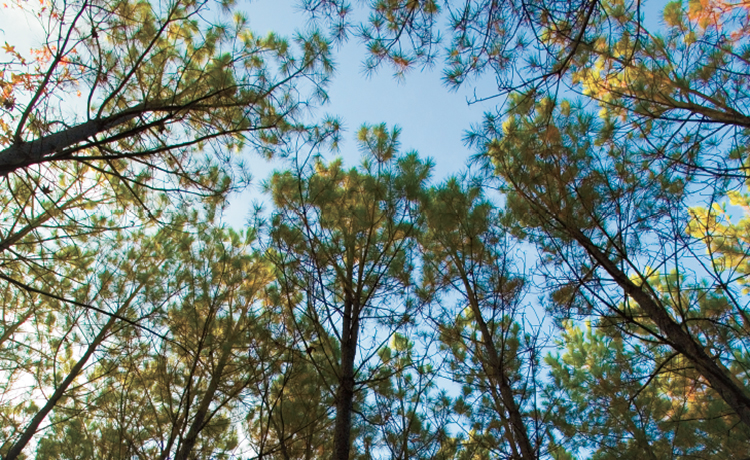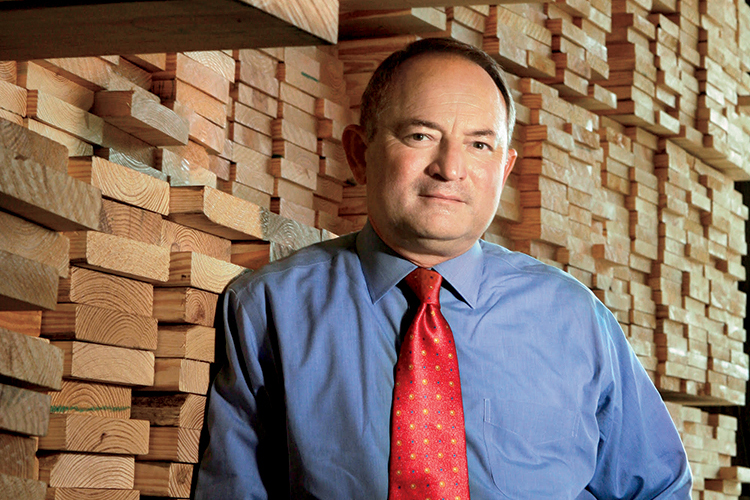Home > Arkansas > Arkansas Crops & Livestock > Arkansas Forestry Industry Standing Tall
Arkansas Forestry Industry Standing Tall

In fact, the Anthony Forest Products Company LLC sawmill in southern Arkansas produces
30 percent more lumber out of the same size logs than in the past. The company has modernized its manufacturing plants, diversified its products and even expanded into Canada to meet demands in the engineered wood products sector.
“What’s really changed and made the industry more efficient is computing power,” says Aubra Anthony, executive vice president of Anthony Forest Products Company LLC. He also represents the Arkansas Forestry Commission as Chairman on the Arkansas Agriculture Board.
“For example, the ability to scan wood, interpret what the camera sees, and then be able to make manufacturing decisions faster and better than humans can. It gives us the information to tell other machines what to do with each particular piece of lumber,” he says. Wooded land covers 56 percent of Arkansas, says Max Braswell, executive vice president of the Arkansas Forestry Association. The industry generates $3.2 billion for the state’s economy and employs more than 27,500 Arkansans, including members of the Anthony family.
Even after a century in the forestry business, the Anthony family business is among more than 200 manufacturing facilities and mills that still call Arkansas home for their forestry operations.
“Arkansas is particularly blessed as a wood basket,” Anthony says, “and it’s one of the strongest remaining wood baskets in the South and in the United States.”

The strength of Anthony Forest Products Company LLC is rooted in diversification of products, markets and customers. Anthony Forest manufactures southern pine lumber, I-joists, wood chips and glued laminated timber from Arkansas- and Louisiana-grown trees. The family operates five plants across the southern United States and a joint venture plant in Canada that manufactures I-joists. The company sells to major national wholesalers that, in turn, distribute to end users and chain retail stores. Anthony Forest Products Company LLC employs 250 people, nearly half the employment in 2005, ahead of the economic recession.
“We have hung together and survived, and now we are thriving again,” he says.
For years, manufacturing building materials sat at the “bleeding edge” of technology, Anthony says. Lack of funds for research departments prompted forest products companies to borrow technology and apply it over time.
Today, the forest products industry uses state-of-the-art equipment that sizes and grades wood, among other tasks previously performed more slowly and manually.
In the spirit of progress, in the 1960s the Anthony family business began to glue lumber together, which grew into a national business.
“It is a true addition of value to convert lumber from a commodity building product into an engineered structural beam or column,” Anthony says.
The Anthony family preserves a forestry history older than the trees that they convert to quality building materials. Their roots in forestry date back a century to 1916.
![Arkansas forestry [INFOGRAPHIC]](https://eadn-wc01-4177395.nxedge.io/wp-content/uploads/2020/06/Screen-Shot-2016-01-21-at-3.53.10-PM.jpg)
Today, a fifth generation in the forestry operation defies the odds in the world of business. Just 3 percent of family businesses operate at the fourth-generation level or beyond, the Family Business Institute reports.
Various individual forestry businesses formed over time among the Anthony family’s brothers, aunts, uncles and cousins. In 2015, the family celebrated 50 years as Anthony Forest Products Company, an entity that merged several individual family business interests in 1965.
Anthony always believed in timber’s environmental benefits, including its carbon-neutral status, and the sustainable management of timberland, while providing shelter and oxygen for fellow Americans.
Braswell says third-party certification programs help identify forest product manufacturers that are trying
to sustainably meet the demands of the marketplace.
“Certification provides real comfort and legitimacy that our forest products are grown and manufactured in a way that allows our forests to be sustainable,” Braswell says.
In late 2015, Anthony Forest Products Company LLC sold the company to Canfor Corporation, which is based in Canada, for $93.5 million. As part of Canfor, the company still runs under the same management, sales and manufacturing teams.
“We are truly excited about this partnership with Canfor, a progressive leader in our industry,” Anthony says.



